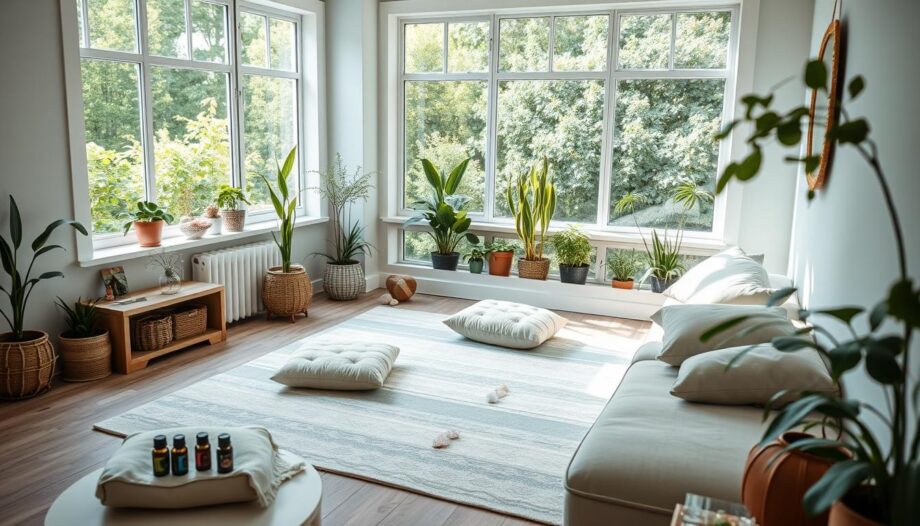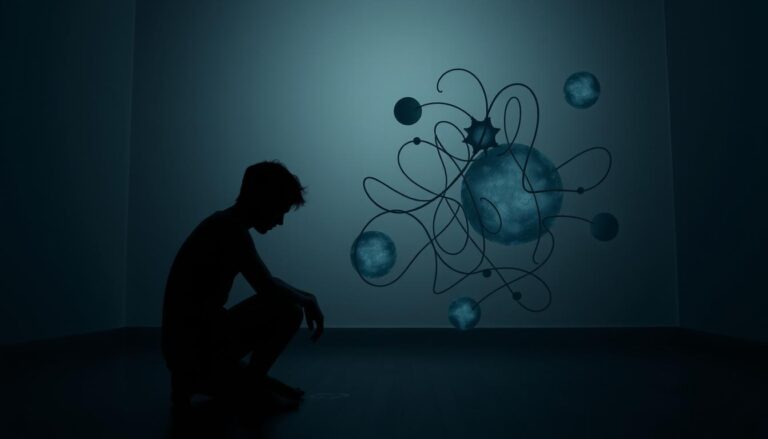Holistic therapy plays a crucial role for those with ADHD. It helps manage symptoms and tackles emotional and social challenges. This approach boosts overall well-being, aiding children’s mental health.
It provides a balanced lifestyle alongside usual treatments. Parents and caregivers now look for natural ADHD support. Diverse therapies identify and tackle underlying issues.
This creates a positive environment, helping children in school and life.
Understanding ADHD: An Overview
ADHD, or Attention Deficit Hyperactivity Disorder, is a brain-based disorder. It affects people’s behavior and can change how they interact with others. Individuals with ADHD may act differently at home, school, or work.
What is ADHD?
This condition involves ongoing issues with attention, hyperactivity, and acting on impulse. Studies suggest that genes might be a key factor in its onset. However, we’re still figuring out the exact reasons1. It often starts in childhood and can continue into later life. That’s why it’s vital to grasp its effects1.
Common Symptoms and Behaviours
ADHD symptoms differ from one person to another. However, some common signs are:
- Finding it hard to keep focus on tasks.
- Not following instructions well, leaving tasks incomplete.
- Being impulsive, like interrupting or acting without thinking.
- Being overly active, such as squirming or not staying seated.
Kids often show more hyperactive and impulsive traits. Adults might not be as hyper but can feel restless1.
Impact on Daily Life for Children and Adults
ADHD significantly affects daily activities. It leads to challenges in school and relationships2. Managing emotions and keeping focused can be tough. Strong support is essential. ADHD is commonly diagnosed in kids and teens, with symptoms evolving over time2.
The Importance of a Holistic Approach to Managing ADHD
To address ADHD effectively, we must look at the whole picture. This process involves a holistic management of ADHD. It means we see each person fully, combining thoughts, physical health, and spirit in their care. This whole-person approach lets us find and treat the deep causes of ADHD symptoms.
Addressing the Whole Person
A mix of methods like diet changes, mental health support, and new daily habits creates a lasting treatment plan. In the US, about 9.4% of kids aged 2-17 were known to have ADHD by 20213. Understanding how different health factors are linked is key. For example, cutting out artificial food colouring can lessen symptoms for one in three kids3. Also, being active for at least 60 minutes a day boosts focus and health in children3.
Restoring Balance in Mind, Body, and Spirit
Balancing ADHD treatment focuses on both physical and mental health. It combines usual therapies with new methods. For instance, mindfulness can help kids focus better and act less on impulse4. Also, omega-3s from fish are essential for a healthy brain4. A balanced life that includes caring for oneself helps manage ADHD’s social and emotional effects, like anxiety or sadness from too much screen time, which has gone up by nearly 50% lately3. A holistic focus on management not only improves health outcomes but also supports people in making the most of their lives.
Holistic Therapy for ADHD: Natural Interventions
Natural methods play a key role in holistic therapy for ADHD. They include changes to diet, mental health activities, and exercise. These help improve behaviour and emotional wellbeing.
Dietary Changes and Nutritional Support
Nutritional support for ADHD begins with changing what you eat. Studies show that omega-3 supplements can make a small difference for those with ADHD5. Eating foods high in vitamin B-6, zinc, and magnesium is also good. But, it’s important to check with a doctor as results can vary.
Mindfulness and Relaxation Techniques
Mindfulness, like yoga and meditation, helps manage ADHD symptoms. They can improve focus and lower stress in kids and teenagers5. Relaxation methods also help reduce hyperactivity and help control emotions.
Exercise and Movement Therapies
Exercise, especially with mental challenges, is effective for ADHD. Activities like martial arts boost alertness and well-being in children with ADHD5. Such exercises improve concentration and motivation as well.
All these natural strategies offer a full plan to manage ADHD. They help people achieve better health and happiness through a whole-person approach.
Integrative Approaches: Combining Conventional and Holistic Therapies
Integrative approaches for ADHD bring together traditional treatments and holistic methods. Medication is key for managing ADHD’s main symptoms. A study shows that polyunsaturated fatty acids (PUFA) might help ADHD symptoms over time, suggesting diet changes could support medication6. Up to 60% of people with ADHD in childhood still face challenges as adults, underlining the need for effective treatment7.
The Role of Medication in Treatment Plans
Medication is crucial for treating ADHD, providing relief from symptoms. However, side effects and individual differences require careful planning. Thus, mixing treatments, including omega-3 fatty acids and behavioural therapy, offers a better overall approach.
Behavioural Therapy: Strategies for Success
Behavioural therapy, like cognitive behavioural therapy (CBT), teaches skills for better behaviour control. By using these strategies with medication, people can greatly improve their problem-solving and organisation skills. This leads to major betterments in life quality. Studies show mindfulness helps focus and lowers impulsiveness in kids with ADHD7. Adding family involvement intensifies the benefits, offering strong support for those with ADHD.
FAQ
What is holistic therapy for ADHD?
Holistic therapy for ADHD looks at the whole person. It aims to help with emotional, social, and behavioural issues. This method works with the mind, body, and spirit. It makes overall well-being better while also supporting standard ADHD treatments.
How do dietary changes help in managing ADHD?
Changing your diet can help manage ADHD. By cutting out certain foods and adding nutrient-rich ones, you can see improvements. A balanced diet helps with clear thinking and emotional control.
What mindfulness practices are beneficial for children and adults with ADHD?
Mindfulness can reduce hyperactivity and help control emotions. Practices like meditation, deep breathing, and relaxation exercises are good. They help better focus and emotional strength.
In what ways does exercise benefit those with ADHD?
Exercise is key for those with ADHD. It boosts physical health, mental clarity, emotional balance, and social skills. It’s a holistic way to manage ADHD.
Can holistic therapy be combined with traditional ADHD treatments?
Definitely, holistic therapy and traditional ADHD treatments can go hand in hand. This mix cares for the whole well-being. It leads to better results and life quality.
What are the main benefits of a whole-person approach to ADHD management?
The whole-person approach balances life by dealing with diet, stress, and emotions. It ensures comprehensive treatment. It improves daily effectiveness.
How can behavioural therapy aid in the treatment of ADHD?
Behavioural therapies like CBT teach problem-solving and organisation skills. Used with medication, they enhance self-management. This makes a structured environment for success academically and personally.





